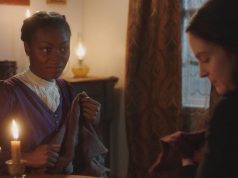This time, HaleStorm Entertainment won’t have to make up quotes from movie critics to use in its advertising.
“The R.M.,” HaleStorm’s follow-up to the amateurish “Singles Ward,” is an altogether amusing, nongrating, nonstupid comedy. It benefits from solid acting and sharp, good-natured humor. The script, again by John E. Moyer and Kurt Hale, is more focused than last time, and so are the cameras. It’s an altogether enjoyable film — not without its flaws, and some of them significant, but diverting nonetheless.
Kirby Heyborne, who played a soon-to-be missionary in “Singles Ward,” is back as a different character, Jared Phelps, just returned from the Wyoming Evanston South Mission of the Church of Jesus Christ of Latter-day Saints. At the airport, he finds no one to greet him. At home, he finds his parents have moved and forgotten to tell him. At his girlfriend’s house, he finds she is engaged to someone else.
With the exception of the last point, Jared’s problems thus far are unbelievable, which makes it hard to find humor in them. (You have to believe a thing could happen before you can laugh at it.) But the film, directed by Kurt Hale, picks up steam from there, realistically and comedically conveying the frustration many returned missionaries feel as they adapt to the real world. I will even accept the airport-no-shows and the moving-without-telling because they set the tone for the film: This will be a one-thing-after-another comedy, where things continue to get worse for the protagonist despite the seeming fact that they couldn’t possibly get worse.
Jared’s family includes multiple children and two extremely busy but loving parents (Tracy Ann Evans and Merrill Dodge). Mom is pregnant, while the oldest sister, Sariah (Maren Ord), is about to marry a doofus named Duey (Michael Birkeland). Jared’s lifelong friend, the fun-loving Kori (“Singles Ward” star Will Swenson), wants to hang out with him, but Jared worries about the influence Kori will have over him.
There are troubles with girls and employment, too, but most of the conflict is internal as Jared struggles to determine how, exactly, serving a mission has blessed him, when everything seems to have been screwed up by his going. These are weighty issues of faith, and while the film doesn’t resolve them very well — in the end, I can’t tell why Jared has reached the conclusion he has — it at least portrays his struggle convincingly.
“The R.M.’s” best asset is Heyborne, who has a likable Everyman quality as Jared. His resolution despite constant setbacks, with an expression of growing weariness about his face, is both funny and appealing. When the film becomes too dramatic in its last act, Heyborne carries it well.
Swenson, who almost made “Singles Ward” tolerable, is good again as Kori, and Tracy Ann Evans gets more than her share of laughs as Jared’s indefatigable dynamo of a mother. Britani Bateman is charismatic as Kelly, Jared’s new love interest.
The celebrity cameos are kept to a minimum this time and do not generally get in the way of the story. The soundtrack, which again features familiar LDS tunes re-cast in modern styles, is fun on its own but distracting within the film. Johnny Biscuit played the most annoying character in “Singles Ward”; this time it is TV personality Scott Christopher, who is embarrassingly unfunny as an attorney, badly dragging down the film’s finale.
But then there are the plusses. One of the best gags involves Jared’s visit to a jewelry store to return his ex-girlfriend’s engagement ring. I won’t spoil it for you, but it cleverly juxtaposes LDS culture with that of the outside world, taking what is familiar to viewers — “it’s funny because it’s true” — and tweaking it enough to earn real laughs.
Jared’s parents’ involvement in selling a Nu Skin-type product, some ward members’ commercial for a wedding Web site, his experiences as a telemarketer — these are legitimately funny sequences, and the first half of the film, especially, is a treat to watch.
What separates “The R.M.” most from “The Singles Ward” is its attitude. In “The Singles Ward,” things were thrown haphazardly onto the screen with regard only for whether the filmmakers thought they were funny. There was a smugness about it: If you don’t laugh, there must be something wrong with YOU.
“The R.M.,” on the other hand, reaches out to its audience and actually wants to be liked. It is not a great film, but it’s a good one, a pleasant one. The parts that make you laugh outnumber the parts that make you roll your eyes.
B- (1 hr., 42 min.; )




